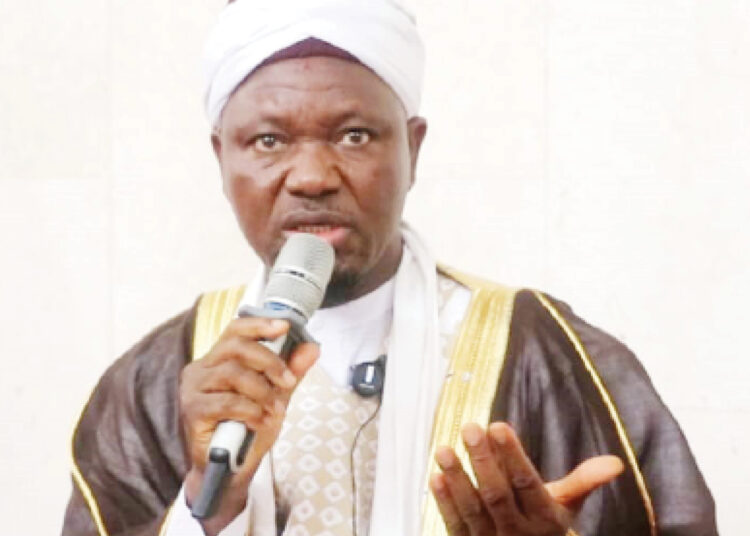Today, I share with my esteemed readers the profound Khutbah delivered on Friday, February 7, 2025 by one of the distinguished imams of the National Mosque in Abuja, Imam Sheikh Dr. Abdulqadir Salman, the revered First Sarkin Malamai and Uban Doma of the Ilorin Emirate.
In a carefully articulated and heartfelt sermon delivered to a large congregation, graced by the presence of His Eminence, the Sultan, Sheikh Abdulqadir addressed the indispensable theme of unity within the Muslim Ummah. He underscored its significance as one of the most fundamental values to which every Muslim must steadfastly adhere.
The Khutbah commenced with a heartfelt invocation of praise to Allah, the Almighty—“Praise be to Allah, abundant and blessed, as our Lord loves and is pleased with.” This opening resonated deeply, serving as a poignant reminder of the oneness of Allah, followed by the affirmation of the Prophethood of Muhammad, sallallaahu alayhi wa sallam. The Imam declared, “I bear witness that there is no god but Allah, alone without partner, and I bear witness that Muhammad is His servant and Messenger.” With this foundational truth established, the speaker called upon the faithful to engage in deeper reflection regarding their identity and purpose.
The central theme of the sermon revolved around the necessity of maintaining unity among Muslims, echoing a divine command articulated in the Glorious Qur’an. The Imam poignantly referenced the verse:
“And remember the favour of Allah upon you when you were enemies, and He brought your hearts together, and you became by His favour brothers.” (Aali Imraan, 103) This profound reminder illuminated the truth that Allah Himself forged the bonds of brotherhood among the believers, transforming enmity into companionship and love. Thus, unity emerges not as a trivial obligation but as a divine blessing that every Muslim must cherish and nurture.
Today, the First Sarkin Malamai asserted, the Islamic community finds itself beset by challenges that threaten its integrity and strength, necessitating that all Muslims work earnestly to preserve cohesiveness. The Imam’s eloquence shone through as he articulated, “The Islamic community needs to be cohesive, for division is a condemned act.” Drawing attention to further admonishment from Allah, the Exalted, he quoted: “And do not be like those who divided and disagreed after the clear proofs had come to them.” (Aali Imraan, 105) With these words, the congregation was reminded of the weighty consequences of discord and the futility of allowing differences to create barriers among them.
The Sheikh elaborated on the extraordinary bond that exists between Muslims, emphasising that this relationship is a precious gift from Allah, fostering a spirit of love, compassion, and mutual support. By invoking the teachings of the Messenger of Allah, Sallallaahu alayhi wa sallam, the Khutbah resonated with profound wisdom: “Hold on to the community, and beware of division, for the devil is with the one who is alone…” This poignant statement painted a vivid picture of how isolation and disunity can undermine the collective strength of believers, rendering them vulnerable to malevolent forces intent on dismantling their unity.
A recurring theme throughout the Khutbah was the counterproductive nature of division. “Always remember that the Ummah (community) is the way to salvation,” the Imam implored, “while division leads to destruction.” This earnest caution urged the congregation to recognise that unity transcends mere social convenience; it is a pivotal path laid out for them by Allah—a means to secure His mercy and guidance.
As the sermon continued, the Imam shifted his focus to the essential message that striving for unity is not merely an act of piety, but a profound display of faith. He poignantly asserted, “The greatest advice I give you is to fear Allah, for piety prompts us to work for the unity of the Ummah and to steer clear of anything that leads to division and disagreement.” This call to consciousness invoked a sense of collective responsibility, urging the Muslims to prioritise their moral obligations above the superficial differences that may seek to undermine their bond.
As he concluded this segment, the Sheikh earnestly prayed, “We ask Allah to unite our words upon the truth and to bring our hearts together.” This heartfelt supplication served to strengthen the resolve of the listeners, forging a shared commitment to uphold the principles of unity in both thought and action.
Transitioning to a broader and more profound perspective, the Imam appealed directly to the identity of the Muslim community. He gently reminded them that Allah refers to them with a noble title: “Indeed, Allah, blessed and exalted, is the one who named you with this honourable name, calling you Muslims.”
This assertion reinforced their collective identity and fostered a sense of pride in their shared faith, invoking Allah’s words: “He has named you Muslims before and in this, that the Messenger may be a witness upon you and you be witnesses over the people.” (Al-Hajj, 78)
The Imam illuminated the notion that, irrespective of the geographical distances that separate them or the diversity of tribes, languages, and skin colours, they remain brothers and sisters in faith. “It is essential to preserve the unity of the Ummah,” he insisted, recognising that the distinctions which exist among humanity should cultivate recognition, love, and unity rather than superiority or contempt. He quoted the Qur’an once more: “O mankind, indeed We have created you from male and female and made you peoples and tribes that you may know one another.” (Al-Hujuraat, 13)
This assertion propelled the discourse into an examination of Allah’s intentions behind human diversity. Such diversity was intended not for the sake of discrimination, but for the enrichment of relationships and the opportunity for mutual understanding. “Indeed, the most noble of you in the sight of Allah is the most righteous of you,” the Imam reminded the faithful, ensuring that their focus remained on righteousness as the true measure of value.
In a moment of reflection, the Imam referenced the guide provided by the Messenger of Allah: “The example of the believers in their mutual love, mercy, and compassion is like that of a single body; when one part of it complains, the rest of the body responds with fever and wakefulness.” This potent analogy vividly illustrates the profound truth that the well-being of one Muslim has direct consequences for all. A challenge to one should evoke concern and action from the entire community. Thus, this interdependence starkly underscores the critical need to nurture unity among the believers.
Reinforcing this theme of unity, the Imam asserted once more that the bond of brotherhood among Muslims transcends tribal and regional affiliations. “Indeed, this, your religion, is one religion, and I am your Lord, so worship Me,” he declared, beseeching them to prioritise their devotion and communal identity over any divisive sentiments that might arise.
The sermon progressed to address key points regarding the necessity of unity among Muslims. The speaker passionately conveyed the crucial directives:
Hold Firmly to the Religion of Allah: The Imam passionately conveyed Allah’s directive to believers: “And hold firmly to the rope of Allah all together and do not become divided.” He stressed the importance of mutual trust, urging the congregation to avoid disputes that could lead to fractures within their community. He eloquently noted Allah’s warning: “And do not become like those who divided and disagreed after the clear proofs had come to them.”
Enhance Reconciliation Among One Another: The address highlighted the imperative of fostering an environment of reconciliation, drawing upon the wisdom of Allah: “There is no good in much of their private conversation, except for those who enjoin charity or good or reconciliation among people.” The Imam further challenged the congregation to actively seek methods to mend relationships, reminding them of Allah’s guidance: “And fear Allah and amend that which is between you.”
Recognise Each Other’s Sacred Rights: The sanctity of Muslim relationships was a focal point, with the Imam reiterating the Prophet’s statement: “The Muslim is the brother of another Muslim; he does not wrong him, nor does he abandon him, nor does he belittle him.” He vehemently underscored that all rights among Muslims—regarding blood, wealth, and honour—are inviolable and sacred, urging the congregation to protect and nurture this sacred bond with sincerity and devotion.
At the end of the Khutbah, the Imam poignantly articulated the consequences of disunity, urging the assembly to recall those who came before them, whose differences led to disintegration and destruction.
“Unite, O Muslims, and do not differ, for those who came before you differed and were destroyed,” he cautioned, drawing upon the historical lessons embedded within Islamic teachings.
With impassioned fervour, the Imam appealed to the congregation to reject the divisive calls of discord and tribalism. “Reject the callers of discord, tribalism, and evil who seek to sow strife among Muslims. May Allah protect us and you from their mischief.” This solemn warning was fortified by the conviction that the Ummah must remain vigilant against those who would disrupt their unity and camaraderie.
In concluding this profoundly impactful sermon, the Imam returned to the invocation and praise of Allah, resting assured that the words spoken were indeed divinely inspired. He fervently encouraged the congregation to extend blessings upon the Messenger of Allah, reinforcing their connection to the Prophet: “Indeed, Allah and His angels send blessings upon the Prophet. O you who have believed, ask [Allah to confer] blessing upon him and ask [Allah to grant him] peace.” He reminded them of the honour that awaits those who sincerely remember the Prophet, urging them to invoke blessings upon Muhammad, the mercy sent to the world, alongside his family and companions.
As the congregation departed, the profound messages of unity, love, and cohesiveness echoed within their hearts, serving as a reminder of their sacred duty to uphold the bonds of brotherhood among Muslims, both in thought and in action. “May Allah bless you and assist us all in preserving the unity of our Muslim Ummah,” concluded the speaker, leaving a lasting impression of hope and aspiration for a brighter, unified future.





